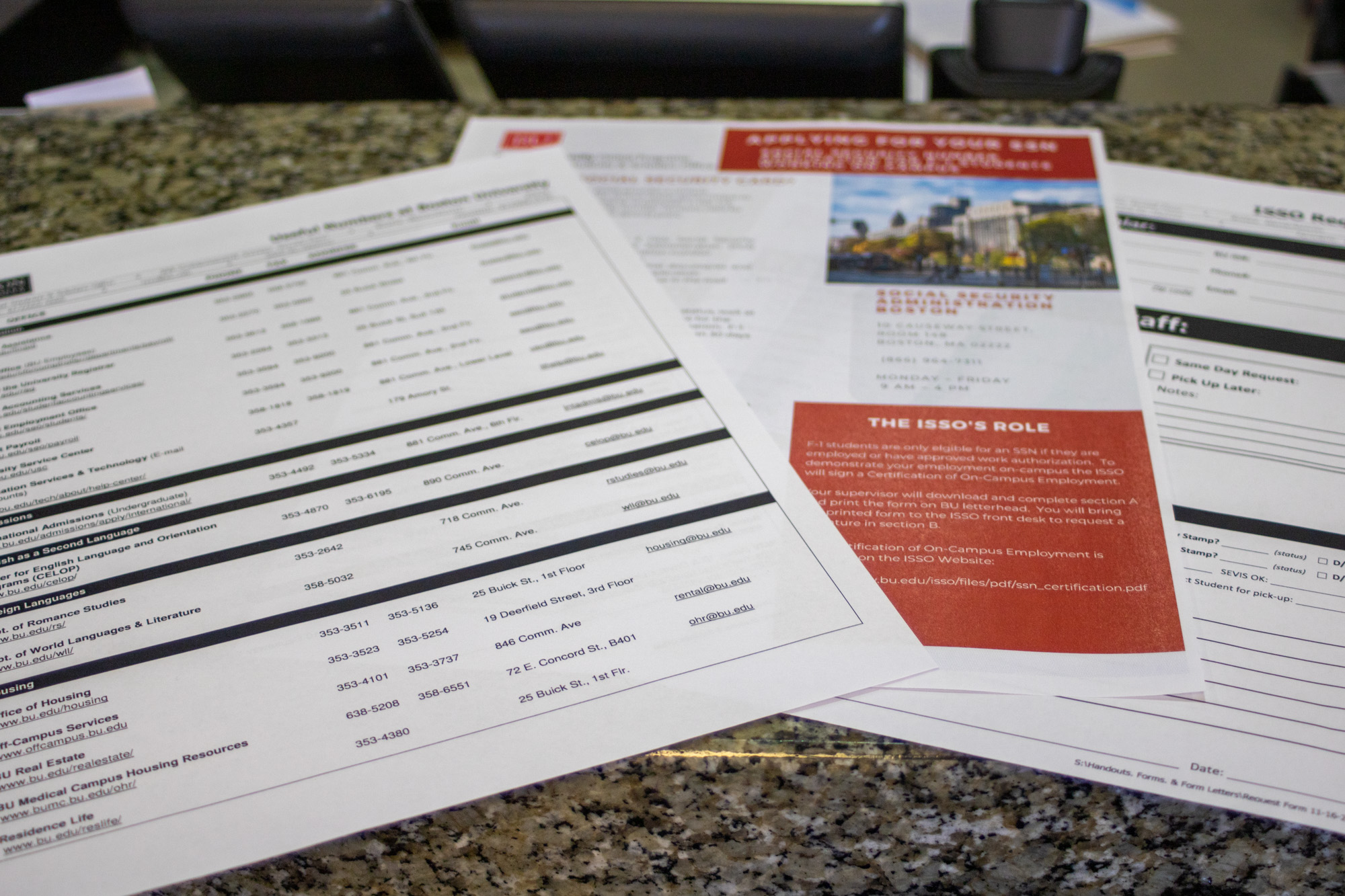Since President Donald Trump took office, efforts to enforce stricter immigration policies have impacted Boston University’s large international student population.

BU confirmed a number of student visas were terminated April 8, adding to the growing number of terminations nationwide. BU said the International Students and Scholars Office is routinely reviewing the Student and Exchange Visitor Information System to stay up-to-date on students’ visa status.
The arrest of Rumeysa Ozturk March 25, a Turkish doctoral student at Tufts University who was taken off the streets of Somerville by plainclothes U.S. Immigration and Customs Enforcement officers for publishing a pro-Palestine op-ed in The Tufts Daily, caused widespread fear about international student safety among the BU community.
Whether the Trump administration has the power to detain international students for involvement in protests continues to be debated in courts, but BU clinical law professor Karen Pita Loor said the First Amendment does not “differentiate” between citizens, non-citizens and international students.
“[The First Amendment] guarantees everyone freedom of speech and freedom of expression,” Pita Loor said. “But this particular administration, despite … constitutional limitations, is really testing the boundaries of their power.”
BU student organizations, including BU Young Democratic Socialists for America, BU Prison Outreach Initiative and the Quinobequin Student Front for Palestine — formerly known as Students for Justice in Palestine — have organized protests and walkouts throughout the semester calling for BU to declare itself a sanctuary campus.
Junior Mary Haddad, who is involved with student activism on campus, said a sanctuary campus is needed to protect immigrants and international students who are politically active.
“We can see that there’s a consistent pattern in not only targeting immigrants, but also targeting immigrants or people with visas who are politically active, and who are denouncing the American Imperial empire,” Haddad said.
On April 26, U.S. Attorney Mark Sauter reported some SEVIS records were being restored, but the Department of Homeland Security clarified it was only for people whose visas have not been revoked.
Among those who did have SEVIS records restored was Columbia University student Mohsen Mahdawi, who was detained for pro-Palestine protests and released April 30.
Professor Nathan Phillips attended a protest at Marsh Plaza April 30, led by BU Medical Campus faculty, to protest the “shameful abduction of university members.” Phillips said the news of SEVIS records being restored and Mahdawi being released indicates “the tide start[ing] to turn,” but further protest is needed.
“The 1,000-plus visa revocations were restored, due to vocal, loud pushback and legal power … I think it needs massive outcry to turn into a tidal wave,” Phillips said. “The release of Mohsen Mahdawi was evidence that when we speak up and push back on bullies, they back down.”
Proposed travel bans have also left some international students unable to return home or be visited by family, including a BU senior whose mom is unable to attend her graduation due to a Trump executive order banning travel from Myanmar.
BUMED Assistant Professor and Director of Graduate Studies Jeannine Foley, who joined Phillips’ April 30 protest, said she anticipates Trump’s policies will result in a loss of international students coming to BU.
“We’re going to lose a lot of international students and that’s a really scary thing, because they contribute significantly to our community,” Foley said.
Foley said the medical school experienced a student from Greece turning down an offer to BU, due to safety concerns about the status of international students in the U.S.
“Our program was their top choice, but they’ve decided to take another opportunity in a country that is safer for international students,” Foley said.
BU launched a Support Pathways Initiative April 25, in an effort to support international students.
This initiative is intended to serve as a resource hub, offering free one-time confidential legal consultations with an external immigration attorney, and other materials, like resources on maintaining student status, on-campus housing support and mental health support.
Haddad said while this effort is a step in the right direction, it’s still “less than the minimum.”
“Guiding towards resources is not the same as providing,” Haddad said. “You made a list, congratulations. That’s not doing the work to protect BU.”
Pita Loor said it is “not enough” to provide international students with a one-time, free consultation with an immigration attorney.
“Whether or not someone is represented makes a huge difference regarding the outcome of their case,” Pita Loor said. “[BU should] actually guarantee that [international students] will be represented on immigration issues.”
Phillips said the initiative is a “great step,” but criticized the University’s lack of communication regarding how staff can support international students.
“I have international students in my classrooms, I have international students I advise and I have gotten nothing from the administration,” Phillips said. “I don’t even know how to take care of my own students, because there’s been no guidance and basic information.”
CORRECTION: A previous version of this article said Professor Nathan Phillips organized the April 30 protest at Marsh Plaza. The protest was organized by BU Medical Campus faculty members. The updated article reflects this change.



















































































































